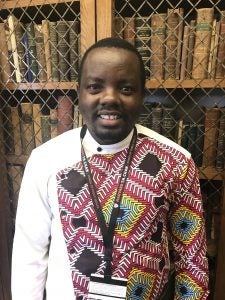 What is your current position?
What is your current position?
I’m currently a family medicine resident. I am doing my family medicine residency in Kenya, where we have three teaching mission hospitals. One of them is Kijabe Hospital, another is Chogoria Hospital, and the Tenwek, Mission Hospital. I am doing rotations within the three hospitals and helping underserved areas in my work.
What in your life brought you to your position today?
My heart is attached to underserved people because I was one of them. That’s why I practice medicine, to serve people who are like me. I come from Burundi, a country that has suffered from cyclic civil wars since the 1960s, and the health system had severely suffered from this. As of today, Burundi is the second poorest country in the World.
In 1994, I became a refugee in Democratic Republic of Congo, where the calling of becoming a doctor was born. At 10 years old, I could not stand seeing people dying because of a lack of medical care in refugee camps. In 2004, I finished high school, and I had to choose a major that would guide my career. I either had to choose law for selfish revenge purposes (multiple family members had been killed the same day in one of those wars) or medicine for humanity purposes. In 2014, I graduated from medical school and started volunteering back in the DRC in very low-income communities. My experience there pushed me to search for more broad knowledge to be well equipped to tackle peoples’ health needs in rural areas. That is why I am doing family medicine.
When were you first introduced to UpToDate?
In 2016, I was doing my rotation in pediatrics, then new coming from Burundi to Kenya. In Burundi, we speak French, and now I’m in an English-speaking country. I needed a place to find information on subjects when we are doing our rounds, so one of my colleagues said there is something called UpToDate. I asked, “How do you get that?” He said, “So, you have to register for it on [Better-Evidence.org].” I did the same day he told me!
How has UpToDate impacted your work on a daily basis?
I registered for UpToDate because I needed information that was easy, quick to access, and most importantly, evidence-based. The background of that is that our university pushes us more to use evidence-based practice rather than relying on your own head, so they push us to have evidence-based practice for each patient you see. Even if you don’t know the answer, do you know how to look for it, at least? Do you know where to look? That place is UpToDate, and that’s how I came to use UpToDate. I have been very happy to have it because I have seen through my friends how it works, and since then, whenever it is about to expire, my heart starts beating faster!
How has UpToDate affected the lives around you?
UpToDate has changed my practice and the practice of the people around me and impacted the patients, because not only am I a resident but I’m also a teacher of others. It has changed those behind me and those who I am in charge of and those I’m caring for. All of my colleagues sent me messages to tell you all. They all say to tell you thank you, and that you all are doing a great job.
How will UpToDate continue to affect your career?
Most importantly, UpToDate is impacting the patients. Everything we do is for the patient. For me to be here at Harvard, I think it’s one of the achievements of my life because not only are you impacting me but also the people I’m serving. So, thank you very much from the bottom of my heart because you are changing me, you have changed my practice, and you have changed what I teach to my students.


